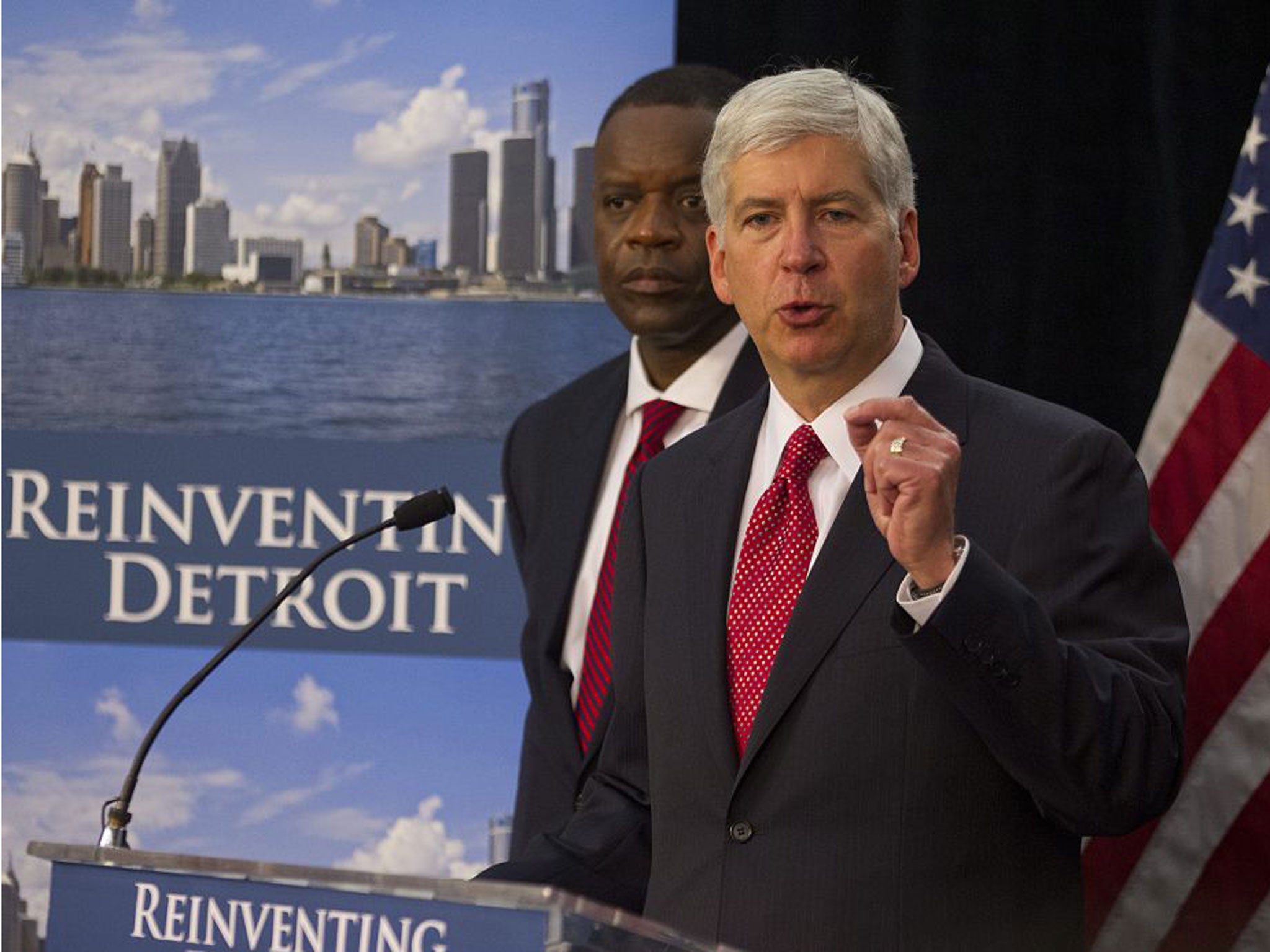Battle to keep bankrupt Detroit solvent...and without a bailout

The governor of Michigan today defended last week’s bankruptcy filing by Detroit even as lawyers for his office moved to contest a ruling by a lower court judge that it violates the state constitution and must be withdrawn.
“This is a very tough decision, but it’s the right decision,” Governor Rick Snyder, a Republican, said on NBC’s Meet the Press. “The citizens of Detroit deserve better than they’re getting today. There were no other viable options.” Kevyn Orr, the Detroit emergency manager appointed by Governor Snyder to try to navigate the city out of some $18 billion (£11.7bn) in debt, announced the move – the largest municipal bankruptcy petition in US history – late Thursday.
On Friday, a county judge, Rosemary Aquilina, ordered it withdrawn, in part on the urging of the pension funds and unions which fear deep cuts in pensions and other benefits for the city’s current and retired workers. The legal wrangle may not delay the bankruptcy filing for long, however, with state officials asking a federal judge to intervene and decide the matter as early as today. In the view of most legal experts, once a bankruptcy petition has been filed, it becomes a matter of federal law putting it beyond the reach of a county court.
With President Barack Obama due in two Midwestern states this week – Illinois and Missouri – to tout his economic recovery plans, pressure is rising from some quarters for a federal bailout of Detroit. Even though bail-outs came for the car industry, whose roots are in Detroit, five years ago, such a lifeline may not materialise for the city. Nor, for the moment at least, is the city asking for it, as Mayor Dave Bing underscored yesterday on the ABC network.
“I think it’s very difficult right now to ask directly for support,” he said. “We’re not the only city that’s going to struggle through what we’re going through. We may be one of the first. We are the largest, but we will absolutely not be the last. And so we have got to set a benchmark in terms of how to fix our cities and come back from this tragedy.” When asked if the city might ask for a federal bail-out, he said: “Not yet”. Among those urging a bail-out is Steven Rattner, former special advisor to the president on the car industry. “No one likes bailouts or the prospect of rewarding Detroit’s historic fiscal mismanagement,” he wrote in the New York Times. “But apart from voting in elections, the 700,000 remaining residents of the Motor City are no more responsible for Detroit’s problems than were the victims of Hurricane Sandy for theirs, and eventually Congress decided to help them.”
Issuing her ruling on Friday, Judge Aquilina said Mr Orr should withdraw his petition at once. “I’m finding the actions that were taken in filing bankruptcy as overreaching and unconstitutional,” she said.
Mr Orr has reassured city workers and retirees that their benefits and pensions would remain untouched for at least half a year as the bankruptcy process is pursued. Detroit has to consider about 100,000 creditors. They notably include the roughly 200,000 retirees of the Police and Fire Retirement System and the General Retirement System.
“We have made a decision that for the balance of this year, the next six months, we’re not touching pensions or health care,” Orr said in the Free Press newspaper. “So all pensioners, all employees you should understand: it’s status quo for the next six months.”
The unelected man with the power
Michael Fletcher
Kevyn Orr has become the face of Detroit’s historic bankruptcy. Until recently, the lawyer was perhaps best known for helping guide Chrysler through its wrenching but ultimately successful 2009 bankruptcy.
Now Mr Orr has rocketed to national prominence for his lead role in trying to free Detroit from at least $18bn (£11.9bn) of debt. He is also charged with restoring to the city basic services that have eroded to dangerous levels.
His decision last week to file the largest municipal bankruptcy in the nation’s history has triggered anger among the city’s creditors as well as its 9,700 current employees and 20,000 retirees, who stand to lose money and benefits.
Mr Orr said bankruptcy offered the best hope for the kind of renewal he envisioned for Detroit in March when he left his cushy job as a partner at the law firm Jones Day to serve an 18-month term as the emergency manager for Detroit.
The $275,000-a-year job gave Mr Orr extraordinary power to run Detroit. He can tear up contracts, hire and fire workers and liquidate city assets. It also put him in the crosshairs of some of Detroit’s civil rights and political leaders, who saw the state-mandated emergency manager role as an undemocratic, and maybe unconstitutional, taking of power. Washington Post
Subscribe to Independent Premium to bookmark this article
Want to bookmark your favourite articles and stories to read or reference later? Start your Independent Premium subscription today.

Join our commenting forum
Join thought-provoking conversations, follow other Independent readers and see their replies